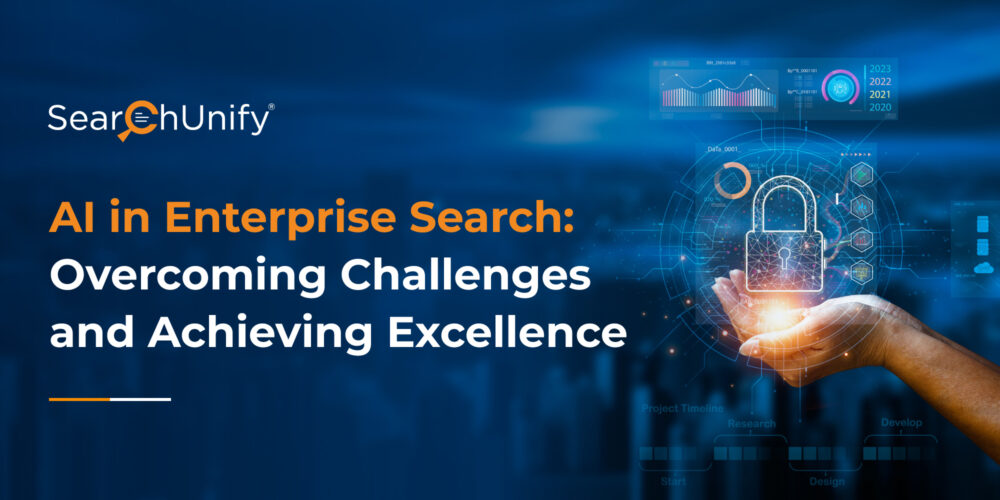
In the vast landscape of digital data where information proliferates at an unprecedented rate, effective information retrieval has become a paramount challenge. And come to think of it, nowhere is this challenge more evident than in customer support where the need for quick issue resolution is crucial.
Picture this: A support agent encountered an intricate case in his queue—a customer reported a complex technical issue that was beyond her usual routine queries he typically handled.
As hours passed, he delved into forums, technical documents, and internal databases. Despite her best efforts, time was slipping away and the delay in resolution fueled customer frustration. The lack of a centralized knowledge base proved to be a significant hurdle. This is just one case.
With global data creation projected to exceed 180 zettabytes by 2025, this poses a concern. That’s where AI-powered enterprise search comes into play, holding the potential to transform support productivity and efficiency. Yet, like any main character in a transformative story, AI brings forth challenges and complexities that require attention before moving forward.
This blog post unveils the obstacles, explores the opportunities, and navigates the intricate landscape of possibilities. Continue reading to delve deeper into the subject.
1. Data Quality and Integration
Errors in categorization and tagging, as well as inconsistencies in data formats and representations, can hinder effective search and retrieval processes. As a result, it can severely compromise the quality and reliability of the extracted information.
The reliance on AI for data management has heightened the importance of robust data governance practices to ensure data quality and consistency. Organizations need to implement data quality checks, establish data standards, and enforce data governance policies to mitigate the potential impact of AI-related errors.
Additionally, continuous training and improvement of AI algorithms are essential to enhance their ability to accurately categorize, tag, and process unstructured data.
2. Security and Privacy

Integrating AI into enterprise search poses challenges for security and privacy, primarily due to the sensitivity of the data involved. Privacy concerns arise as AI sifts through personal employee data, necessitating strict user access protocols.
Additionally, the potential for bias in AI algorithms requires continuous monitoring and mitigation efforts to ensure fairness. Cybersecurity threats, data storage issues, and compliance with regulations add further complexity.
Striking a balance between efficient search functionality and safeguarding sensitive information requires a comprehensive strategy and ongoing adaptation to the evolving landscape of security and privacy concerns.
3. Algorithm Bias
The accuracy and fairness of AI-powered search results hinge on the impartiality of the data used to train the algorithms. Biased data can lead to skewed and inaccurate search outcomes, jeopardizing the reputation and trust of organizations relying on these systems.
The intricate nature of AI algorithms further compounds the challenge of identifying and rectifying such biases swiftly. To uphold the integrity of search results and foster transparency, organizations must implement robust measures to detect, address, and prevent bias within their AI algorithms.
4. Continuous Improvement
Improving the AI-powered search based on customer feedback can be challenging but at the same time could be an opportunity to ensure a positive customer experience. This continuous improvement process based on user interactions, adapts AI-based tools based on customer input and provides more personalized responses that align the AI technology with user experience.
Companies face challenges as employees are reluctant to adapt these tools for fear of losing their jobs. Also, due to the complexity of AI-based tools, proper training and guidance are required to gain full advantage of the technology.
Smart Searching: How AI Enhances Enterprise Efficiency
While implementing AI in search the possibilities are endless, we should know about them in advance to create a strategy accordingly and unlock the full potential of these opportunities. Let’s explore the horizons of AI to get a clearer picture.
1. Improved Search Relevance
AI has reached an advanced stage, enabling it to effortlessly decipher the context, intent, and natural language of search queries, thereby delivering precise and pertinent results. Beyond simple keyword matching, AI excels in semantic understanding, establishing connections between terms within a given context.
The capability of AI extends to predictive search, analyzing user behavior, search patterns, and engagement rates to offer highly personalized search outcomes. This not only enhances the accuracy of search results but also significantly influences their relevance, ensuring a positive and tailored customer experience.
2. Time and Cost-saving
Employee productivity can be enhanced if the relevant information is easily accessible to them. This will ensure a seamless workflow, saving employees’ time and allowing them to focus on more critical tasks.
Moreover, with the automation of L1 tasks, there is a reduction in human errors associated with such types of tasks. What’s more, AI can identify outdated and duplicate information which leads to saving the storage space, thus enabling effective data management while reducing the cost.
3. Analytics and Insights

AI supports organizations in making informed decisions and developing strategies by providing valuable insights from user behavior and content consumption.
Monitoring these insights not only enhances customer satisfaction but also fosters positive user experiences through tailored outcomes. These analytics don’t just provide personalized experiences but also pinpoint areas for improvement, contributing to optimized performance. Crafting strategies based on market trend analytics empowers companies to outpace competitors, paving the way for success.
4. Content Findability
AI is a transformative tool that simplifies content search and navigation by automatically tagging the data and retrieving the information. To ensure a smooth user journey, it undergoes predictive search suggestions anticipating the users’ need before it arises.
This, in turn, enhances the customer experience by guiding the individual to the most relevant results based on their behavior and user journey. It can also handle complex queries with multiple parameters and conditions resulting in an improved overall search experience.
Ready to Achieve Excellence in Enterprise Search?
The future of AI is brimming with promise, presenting abundant opportunities for businesses. Tackling its challenges not only unlocks immense potential but also paves the way for enhancing customer experiences and gaining a competitive edge through in-depth analysis of market trends.
Let’s become part of that promising future using this AI-based enterprise search and ensure your future success. Start your ‘FREE’ trial today!



















